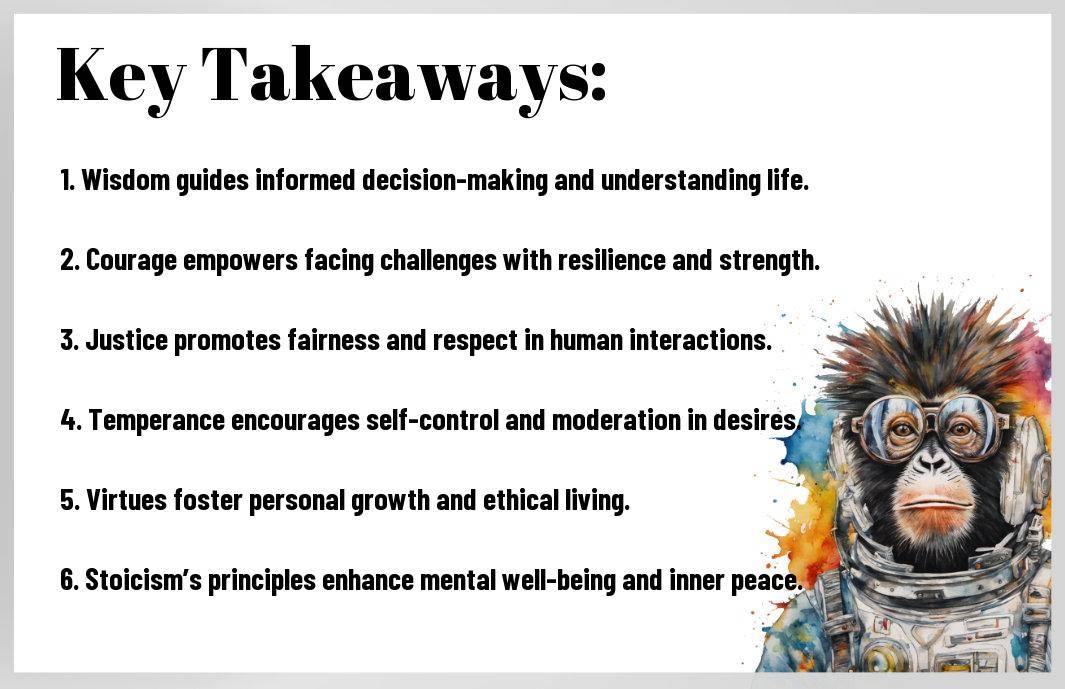There’s something incredibly empowering about embracing the principles of Stoicism. As I’ve explored its teachings, I’ve learned that the four virtues—wisdom, courage, justice, and temperance—serve as guiding lights in our daily lives. Understanding these virtues not only enhances my emotional resilience but also helps you navigate life’s challenges more effectively. Join me as we research into each virtue and discover why they matter, both in personal growth and in fostering better relationships with ourselves and others.
Key Takeaways:
- Wisdom: This virtue involves understanding what is good, bad, and indifferent. It emphasizes sound judgment and insight in decision-making.
- Courage: Courage is about facing fears, enduring hardship, and taking action despite challenges. It empowers individuals to pursue their values and principles.
- Justice: Justice entails fairness and the well-being of others. It promotes a sense of community and the importance of treating people with respect and equality.
- Temperance: This virtue represents self-control and moderation. It helps individuals manage desires and impulses, leading to a balanced and harmonious life.
- Personal Growth: Embracing the four virtues encourages continuous self-improvement and developing resilience in the face of adversity.
- Conflict Resolution: Practicing these virtues can lead to more peaceful interactions and better conflict resolution, fostering stronger relationships.
- Life Philosophy: The four virtues provide a philosophical framework for living a meaningful life, guiding decisions and encouraging ethical behavior.


The Virtue of Wisdom
While exploring the virtue of wisdom in Stoicism, I find that it serves as a guiding light in our decision-making processes. Wisdom empowers us to discern what is truly important and what is not, helping us navigate life’s complexities with clarity and confidence. It’s about more than just accumulating knowledge; it’s about understanding how to apply that knowledge effectively in the many facets of our lives. With wisdom, I can balance my emotions, assess situations more fairly, and engage with others in a way that fosters deeper connections and mutual understanding.
Understanding Knowledge
Understanding knowledge is fundamental to developing wisdom. It goes beyond the mere collection of facts; it encompasses critical thinking, reflection, and depth of insight. When I consider my knowledge base, I strive to comprehend how all these pieces fit together and how they can inform my actions. By questioning what I know and seeking to learn more, I cultivate a mindset open to growth and adaptation, which is imperative in a world that constantly changes. This practice allows me to evaluate the validity and relevance of my beliefs and the information I encounter.
Practical Applications of Wisdom
At the heart of applying wisdom in my daily life is the ability to make thoughtful choices based on sound judgment. I find that wisdom is about considering the long-term consequences of my actions rather than succumbing to immediate desires or societal pressures. By evaluating situations through a lens of reason, I can create a more thoughtful response, whether that’s in personal relationships or professional scenarios. It encourages me to pause and assess before acting, helping me respond to challenges in a way that aligns with my values and ultimately leads to better outcomes for everyone involved.
Applications of wisdom in everyday encounters might include practicing empathy by truly listening to others, even in heated discussions. It might also involve knowing when to let go of a situation that doesn’t serve me well or making decisions grounded in my core principles rather than fleeting emotions. By wielding wisdom in these ways, I can navigate life with integrity and purpose, ultimately fostering a more fulfilling existence for myself and those around me.
The Virtue of Courage
Some people think of courage as merely the absence of fear, but for me, it’s much more than that. It’s about facing challenges head-on, embracing discomfort, and stepping outside my comfort zone. Courage allows me to tackle life’s inevitable obstacles, equipping me with the mindset I need to persevere, even when the odds seem stacked against me. By cultivating this virtue, I can approach adversity with a sense of strength and resilience that empowers me to keep moving forward, no matter what stands in my way.
Facing Challenges Head-On
Before navigating through tough times, it’s vital to acknowledge my feelings of fear or uncertainty. These emotions are entirely natural and part of the human experience. Instead of shying away from them, I make it a point to lean into these feelings, understanding that they signal the potential for personal growth. Each challenge I encounter becomes a unique opportunity for me to practice courage, teaching me that the only way to truly overcome obstacles is to confront them directly. This mindset allows me to approach difficulties with a clear intention, making it easier to find solutions and learn from the experience.
Cultivating Inner Strength
Challenges can sometimes feel overwhelming, but they offer fertile ground for cultivating inner strength. Each time I push through discomfort and face my fears, I build resilience that prepares me for future trials. The more I confront my challenges head-on, the more confidence I gain in my ability to navigate life’s uncertainties. It’s a remarkable transformation, as I begin to view each challenge not as a burden, but as a chance to expand my capacity for bravery. Courage, then, becomes a part of who I am, allowing me to thrive even in the face of adversity.
Indeed, cultivating inner strength is an ongoing journey that enriches my life in ways I never thought possible. With each challenge I embrace, I discover a newfound depth to my character and a sense of empowerment that fuels my desire to grow. This inner fortitude not only helps me face personal struggles but also inspires those around me to confront their fears and pursue their own paths to courage. Becoming acquainted with my strength assures me that I can tackle whatever surprises life may bring my way.
The Virtue of Justice
Many people often overlook the significance of justice in our daily lives, but I believe it’s one of the core virtues that can greatly enhance our interactions with others and guide us in making ethical decisions. Justice encourages us to treat others fairly, respect their rights, and uphold the standards of equity. It serves as a reminder that we are all part of a larger community, and our actions can either uplift or undermine those around us. When we embrace this virtue, we contribute to a more harmonious society where everyone has the opportunity to thrive.
The Importance of Fairness
To cultivate a sense of fairness, I make a conscious effort to evaluate my decisions and actions not just in light of my own interests, but also considering the impact they have on others. Fairness is about ensuring that everyone is treated with respect, and I find it quite fulfilling to take steps that promote balance in my relationships and daily encounters. When I strive for fairness, I create an environment where open dialogue and mutual respect can flourish.
Building Stronger Communities
Between individuals, justice plays a vital role in fostering a sense of belonging and interconnectedness. When you and I actively practice fairness in our daily lives, we pave the way for creating stronger communities. This is not merely about avoiding harm; it’s about promoting a culture where everyone feels valued and heard. In such a community, cooperation can thrive, and we can tackle challenges together, making our social fabric more resilient.
Justice also empowers individuals to stand up for each other and advocate for necessary change. When I see my peers acting with fairness and integrity, it inspires me to do the same. Justice encourages me to be actively involved in my community, whether that means volunteering my time, supporting local initiatives, or simply being a good neighbor. By working together, we can create a network of support that benefits everyone, making our communities more cohesive and vibrant places to live.

The Virtue of Temperance
After venturing into the depths of Stoic philosophy, I often find myself reflecting on the importance of temperance. This virtue encourages us to exercise self-control, moderation, and balance in our lives. It’s not about suppressing our desires or living a life devoid of pleasure; rather, it’s about finding harmony within ourselves and ensuring that our actions align with our values. As we navigate through daily challenges, embracing temperance can lead to a more fulfilled and serene existence.
Finding Balance in Life
Above all, I believe that balance is key to a successful and enjoyable life. It means ensuring that we prioritize what truly matters while letting go of excesses that can lead us astray. When I cultivate temperance, I find that I can enjoy the pleasures of life—be it food, entertainment, or even social interactions—without overindulging. It creates a space where I can appreciate moments for what they are, rather than getting lost in the chaos or the compulsions that often come with them.
Moderation as a Pathway to Peace
By practicing moderation, I have come to see it as a gateway to inner peace. Instead of being pulled in various directions by my desires, I find it easier to focus on what genuinely brings joy and fulfillment. Living with moderation allows me to confront challenges with a clear mind and a calm spirit. When I resist the temptation to indulge excessively in anything—whether it be work, food, or leisure—I create a sense of stability in my life that promotes tranquility.
Balance in my day-to-day activities helps me manage stress and maintain emotional health. When I give myself permission to enjoy life within the confines of moderation, I find that I have more energy, creativity, and positivity. This harmonious approach not only improves my well-being but also enhances my relationships, as I am more present and engaged with those around me. Through temperance, I realize that the simplest joys can be the most profound and rewarding when experienced with mindfulness and moderation.
How the Four Virtues Interconnect
To truly understand the Four Virtues of Stoicism—wisdom, courage, justice, and temperance—it’s enlightening to see how they intertwine and support one another. In my experience, when I practice wisdom, I become more attuned to the right actions and decisions in my life. This awareness often gives me the strength to act courageously when faced with challenges. For instance, when I have to make a difficult decision, it’s my understanding of what is truly just that fuels my resolve, pushing me to take bold steps even when fear looms large.
To grasp the full impact of these virtues, think about how they function together in various situations. When I exercise temperance by moderating my desires and impulses, I find that my capacity for justice becomes clearer. This balance helps me recognize what is fair not only to myself but also to others around me. So, as you explore these virtues, consider how they can enhance each other in your daily life. You’ll find that practicing one can naturally lead you to improve in the others, creating a harmonious framework that guides your decisions and strengthens your character.
Real-Life Examples of Stoic Virtues
Unlike the ancient philosophers who penned their thoughts in serene gardens, I find inspiration from everyday individuals who embody Stoic virtues in their lives. Take a moment to think about someone you know who exhibits wisdom, courage, justice, or temperance. For instance, consider a friend who calmly navigates challenges at work. They demonstrate wisdom by weighing their options thoughtfully and courage through their willingness to tackle tough conversations. Observing how they handle stress can remind you to adopt a similar mindset in your own encounters.
I also think of those who show incredible resilience in the face of adversity. A family member or even a public figure can serve as exemplars of justice, standing up for what they believe is right—even when it’s unpopular. Their actions not only inspire me but also encourage me to reflect on my own values and how I can embody them in my daily interactions. The beauty of Stoic virtues lies in their practicality; they’re not lofty ideals reserved for philosophers but rather guiding principles that can transform how we live our lives.
To wrap up
With this in mind, I truly believe that embracing the Four Virtues of Stoicism—wisdom, courage, justice, and temperance—can transform not only our outlook on life but also our everyday interactions. By incorporating these principles into your life, you can navigate challenges with resilience and build a strong foundation for personal growth. I encourage you to explore these virtues further. You might find valuable insights in A Guide to the 4 Stoic Virtues: The Greek Path To A Good Life, which can provide a deeper understanding of how to apply them in practical ways.
Adopting these virtues has been a journey for me, and I’ve experienced transformative shifts in how I view my responsibilities and relationships. I hope you will consider integrating these Stoic principles into your life, as they can offer a sense of clarity and purpose. Together, we can strive to embody these virtues and inspire others to do the same, creating a ripple effect of positive change in our communities and beyond.
FAQ
Q: What are the Four Virtues of Stoicism?
A: The Four Virtues of Stoicism are Wisdom, Courage, Justice, and Temperance. These principles form the cornerstone of Stoic philosophy, guiding individuals toward a life of virtue and moral integrity.
Q: How does the virtue of Wisdom manifest in daily life?
A: Wisdom, in Stoic philosophy, involves the ability to make sound judgments and decisions based on knowledge and understanding. In daily life, this can manifest as critical thinking, evaluating situations before reacting, and seeking knowledge that enhances personal growth and informs ethical choices.
Q: What role does Courage play in Stoicism?
A: Courage is about facing challenges and adversity without succumbing to fear or hesitation. In practice, this means embracing discomfort, standing up for one’s beliefs, and maintaining integrity in difficult situations, all while enduring personal suffering or societal pressures.
Q: Can you explain the virtue of Justice in the context of Stoicism?
A: Justice, for Stoics, means treating others fairly and with respect, as well as contributing positively to society. This virtue emphasizes the importance of community and working toward the collective good, ensuring that one’s actions align with fairness and ethical standards.
Q: How does Temperance influence Stoic behavior?
A: Temperance involves self-control and moderation in all aspects of life. It helps individuals manage their desires and impulses, fostering a balanced approach to pleasure and pain. Practicing temperance leads to greater emotional resilience and discipline in pursuing long-term goals.
Q: Why are the Four Virtues important for personal development?
A: The Four Virtues of Stoicism are integral to personal development as they encourage individuals to cultivate a strong moral compass, navigate life’s challenges effectively, and promote inner peace. By embodying these virtues, individuals can develop resilience, emotional intelligence, and a profound sense of purpose.
Q: How can someone start integrating these virtues into their life?
A: To integrate the Four Virtues into daily life, one can start by identifying specific areas for improvement associated with each virtue. For example, setting aside time for self-reflection (Wisdom), pushing oneself to try new experiences (Courage), volunteering or helping others (Justice), and practicing moderation in consumption (Temperance) can be effective steps. Engaging with Stoic texts and communities can also provide guidance and support.



